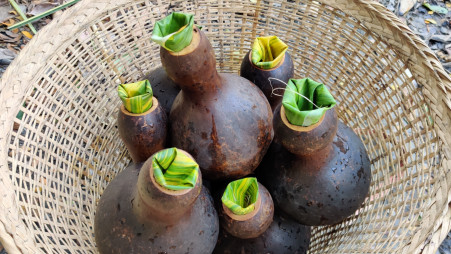Tale of ‘Tuiya’: Water pots made from bottle gourd
The pots are not only environmentally friendly but also keep the water cool

During a recent hike in the Chimbuk hill of Bandarban, a group of Jhumia (Jhum farmers) were spotted working on a Jhum (shifting cultivation) land. The farmers had some rather fascinating pots with them and every once in a while, they were drinking water from the pots.
The sight might have looked rather odd to the untrained eye but indigenous people have been using such pots made from bottle gourds to traditionally store water for a long time.
Two of the farmers Chintui Mro and Ruiton Mro said they use these water pots both at home and outdoors. The pots are not only environmentally friendly but also keep the water cool.
During summer days, many farmers bury their water-filled gourd pots under banana trees while working at the Jhum fields. This cools down the water like refrigeration within a couple of hours.
According to Mro and Khumi people who have a higher rate of using such pots, the water can be stored in the pots for at least a week.
"In the remote areas of Bandarban, most Khumi people still use gourd pots. We decided to carry the traditions of our ancestors," said Shiaung Khumi, member of Bandarban District Council and vice-president of the Khumi Social Council.

The pots also last for years. The gourd water pots are also believed to purify the water and keep it clean.
Every Mro and Khumi household has such pots by the dozen. Alongside them, some Tripura and Bawms also use water pots made of bottle gourd.
How the bottle gourd water pots came about
In an attempt to learn the history of the water pots, this correspondent contacted Younguang Mro, a writer and researcher of the Mro culture. He said the pots are traditionally known as "Tuiya."
About the emergence of such pots, Younguang said, it is likely the pots were first introduced during a battle between the Mro and the Khumi in 90 AD.

"The Mro lost the battle and had to go hiding in jungles. To survive, they had to invent quite a few new things, from food to storage containers. They possibly learned how to make Tuiya during this time," added Younguang.
How the pots are made
The pots are made from fully mature bottle gourds.
First, a small hole is punched in bottle gourds and water is poured in. The gourds are kept like that for about two weeks. After that, the inside of the gourds is thoroughly cleaned and dried under the sun.
After that, the dried gourds are hung on the top of the stove for a few months. During this time, the outer parts of the gourds turn black. The gourds are then properly washed and are ready to be used.
Most Mro and Khumi people prefer drinking water from these pots over modern alternatives like plastic or aluminium containers.

Tailen Mro, a resident of Ramri Para (a thorp) on Chimbuk hill, said, "We have gotten used to using these pots. Now, if we drink from plastic pots, they reek of plastic to us."
Melkon Mro, another resident, said they collect water from nearby Jhiri (a stream) daily.
"We take at least 10 – 12 pots in a Thurung (a basket) and go to the Jhiri to collect water. The rims of the pots are later covered with banana leaves so that the water remains clean," she added.



 Keep updated, follow The Business Standard's Google news channel
Keep updated, follow The Business Standard's Google news channel
















